Physiology Analysis of Fitness and Physiological Factors in Cricket
VerifiedAdded on 2023/06/11
|14
|4370
|152
AI Summary
This analysis focuses on the physiological and biomedical factors that are crucial to the fitness components of cricket. It includes an analysis of the important physical components, physiological and biochemical factors that regulate performance, and physiological factors that influence training and performance.
Contribute Materials
Your contribution can guide someone’s learning journey. Share your
documents today.
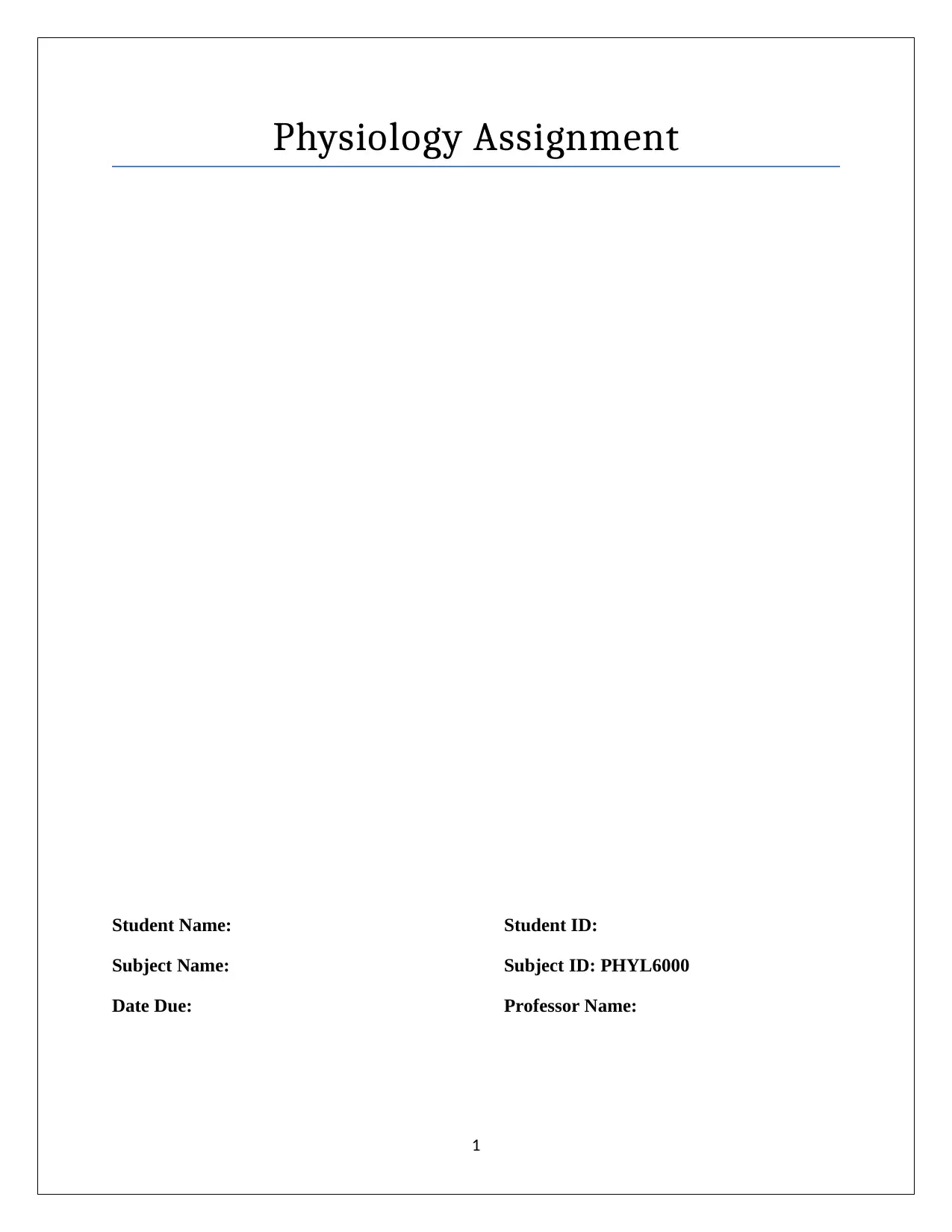
Physiology Assignment
Student Name: Student ID:
Subject Name: Subject ID: PHYL6000
Date Due: Professor Name:
1
Student Name: Student ID:
Subject Name: Subject ID: PHYL6000
Date Due: Professor Name:
1
Secure Best Marks with AI Grader
Need help grading? Try our AI Grader for instant feedback on your assignments.
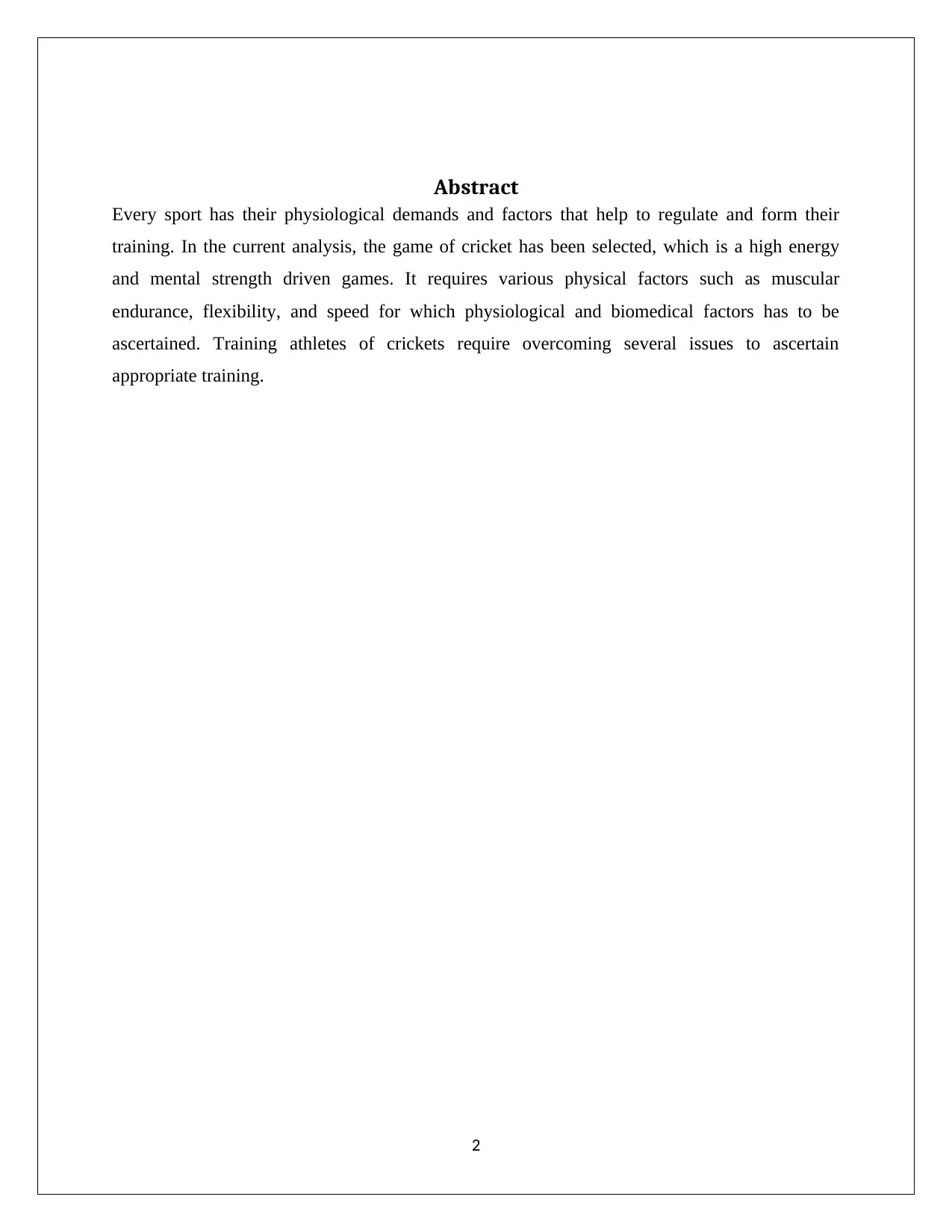
Abstract
Every sport has their physiological demands and factors that help to regulate and form their
training. In the current analysis, the game of cricket has been selected, which is a high energy
and mental strength driven games. It requires various physical factors such as muscular
endurance, flexibility, and speed for which physiological and biomedical factors has to be
ascertained. Training athletes of crickets require overcoming several issues to ascertain
appropriate training.
2
Every sport has their physiological demands and factors that help to regulate and form their
training. In the current analysis, the game of cricket has been selected, which is a high energy
and mental strength driven games. It requires various physical factors such as muscular
endurance, flexibility, and speed for which physiological and biomedical factors has to be
ascertained. Training athletes of crickets require overcoming several issues to ascertain
appropriate training.
2
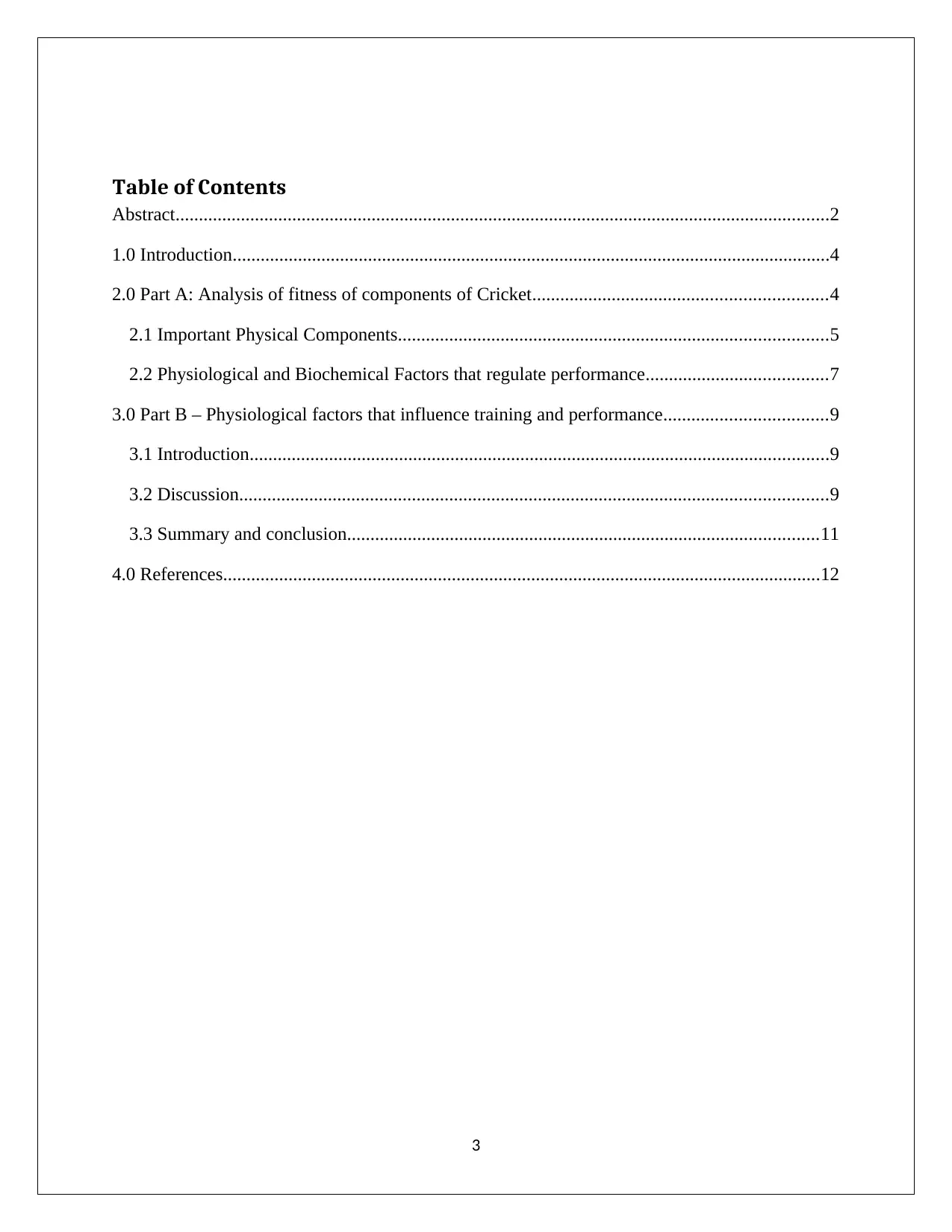
Table of Contents
Abstract............................................................................................................................................2
1.0 Introduction................................................................................................................................4
2.0 Part A: Analysis of fitness of components of Cricket...............................................................4
2.1 Important Physical Components............................................................................................5
2.2 Physiological and Biochemical Factors that regulate performance.......................................7
3.0 Part B – Physiological factors that influence training and performance...................................9
3.1 Introduction............................................................................................................................9
3.2 Discussion..............................................................................................................................9
3.3 Summary and conclusion.....................................................................................................11
4.0 References................................................................................................................................12
3
Abstract............................................................................................................................................2
1.0 Introduction................................................................................................................................4
2.0 Part A: Analysis of fitness of components of Cricket...............................................................4
2.1 Important Physical Components............................................................................................5
2.2 Physiological and Biochemical Factors that regulate performance.......................................7
3.0 Part B – Physiological factors that influence training and performance...................................9
3.1 Introduction............................................................................................................................9
3.2 Discussion..............................................................................................................................9
3.3 Summary and conclusion.....................................................................................................11
4.0 References................................................................................................................................12
3
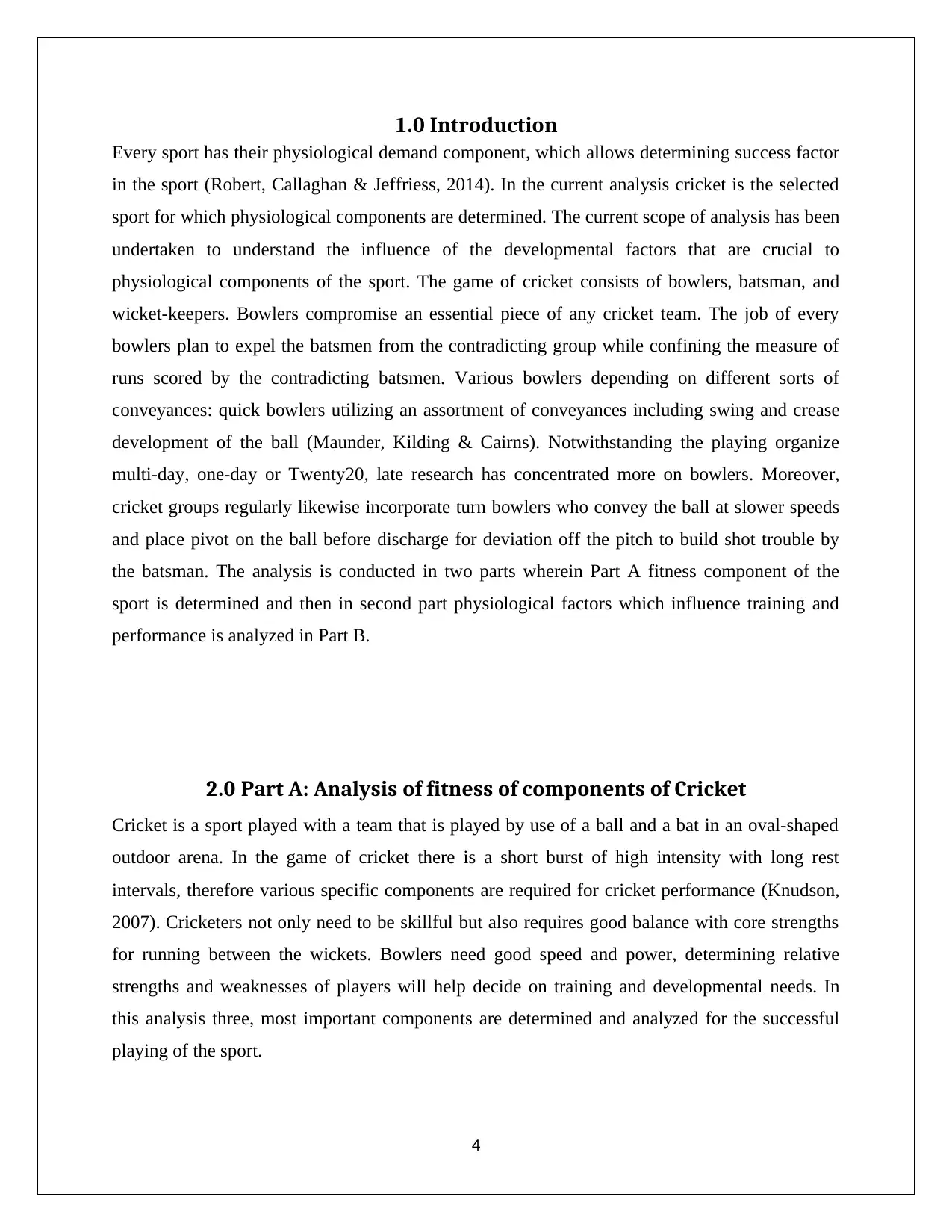
1.0 Introduction
Every sport has their physiological demand component, which allows determining success factor
in the sport (Robert, Callaghan & Jeffriess, 2014). In the current analysis cricket is the selected
sport for which physiological components are determined. The current scope of analysis has been
undertaken to understand the influence of the developmental factors that are crucial to
physiological components of the sport. The game of cricket consists of bowlers, batsman, and
wicket-keepers. Bowlers compromise an essential piece of any cricket team. The job of every
bowlers plan to expel the batsmen from the contradicting group while confining the measure of
runs scored by the contradicting batsmen. Various bowlers depending on different sorts of
conveyances: quick bowlers utilizing an assortment of conveyances including swing and crease
development of the ball (Maunder, Kilding & Cairns). Notwithstanding the playing organize
multi-day, one-day or Twenty20, late research has concentrated more on bowlers. Moreover,
cricket groups regularly likewise incorporate turn bowlers who convey the ball at slower speeds
and place pivot on the ball before discharge for deviation off the pitch to build shot trouble by
the batsman. The analysis is conducted in two parts wherein Part A fitness component of the
sport is determined and then in second part physiological factors which influence training and
performance is analyzed in Part B.
2.0 Part A: Analysis of fitness of components of Cricket
Cricket is a sport played with a team that is played by use of a ball and a bat in an oval-shaped
outdoor arena. In the game of cricket there is a short burst of high intensity with long rest
intervals, therefore various specific components are required for cricket performance (Knudson,
2007). Cricketers not only need to be skillful but also requires good balance with core strengths
for running between the wickets. Bowlers need good speed and power, determining relative
strengths and weaknesses of players will help decide on training and developmental needs. In
this analysis three, most important components are determined and analyzed for the successful
playing of the sport.
4
Every sport has their physiological demand component, which allows determining success factor
in the sport (Robert, Callaghan & Jeffriess, 2014). In the current analysis cricket is the selected
sport for which physiological components are determined. The current scope of analysis has been
undertaken to understand the influence of the developmental factors that are crucial to
physiological components of the sport. The game of cricket consists of bowlers, batsman, and
wicket-keepers. Bowlers compromise an essential piece of any cricket team. The job of every
bowlers plan to expel the batsmen from the contradicting group while confining the measure of
runs scored by the contradicting batsmen. Various bowlers depending on different sorts of
conveyances: quick bowlers utilizing an assortment of conveyances including swing and crease
development of the ball (Maunder, Kilding & Cairns). Notwithstanding the playing organize
multi-day, one-day or Twenty20, late research has concentrated more on bowlers. Moreover,
cricket groups regularly likewise incorporate turn bowlers who convey the ball at slower speeds
and place pivot on the ball before discharge for deviation off the pitch to build shot trouble by
the batsman. The analysis is conducted in two parts wherein Part A fitness component of the
sport is determined and then in second part physiological factors which influence training and
performance is analyzed in Part B.
2.0 Part A: Analysis of fitness of components of Cricket
Cricket is a sport played with a team that is played by use of a ball and a bat in an oval-shaped
outdoor arena. In the game of cricket there is a short burst of high intensity with long rest
intervals, therefore various specific components are required for cricket performance (Knudson,
2007). Cricketers not only need to be skillful but also requires good balance with core strengths
for running between the wickets. Bowlers need good speed and power, determining relative
strengths and weaknesses of players will help decide on training and developmental needs. In
this analysis three, most important components are determined and analyzed for the successful
playing of the sport.
4
Secure Best Marks with AI Grader
Need help grading? Try our AI Grader for instant feedback on your assignments.
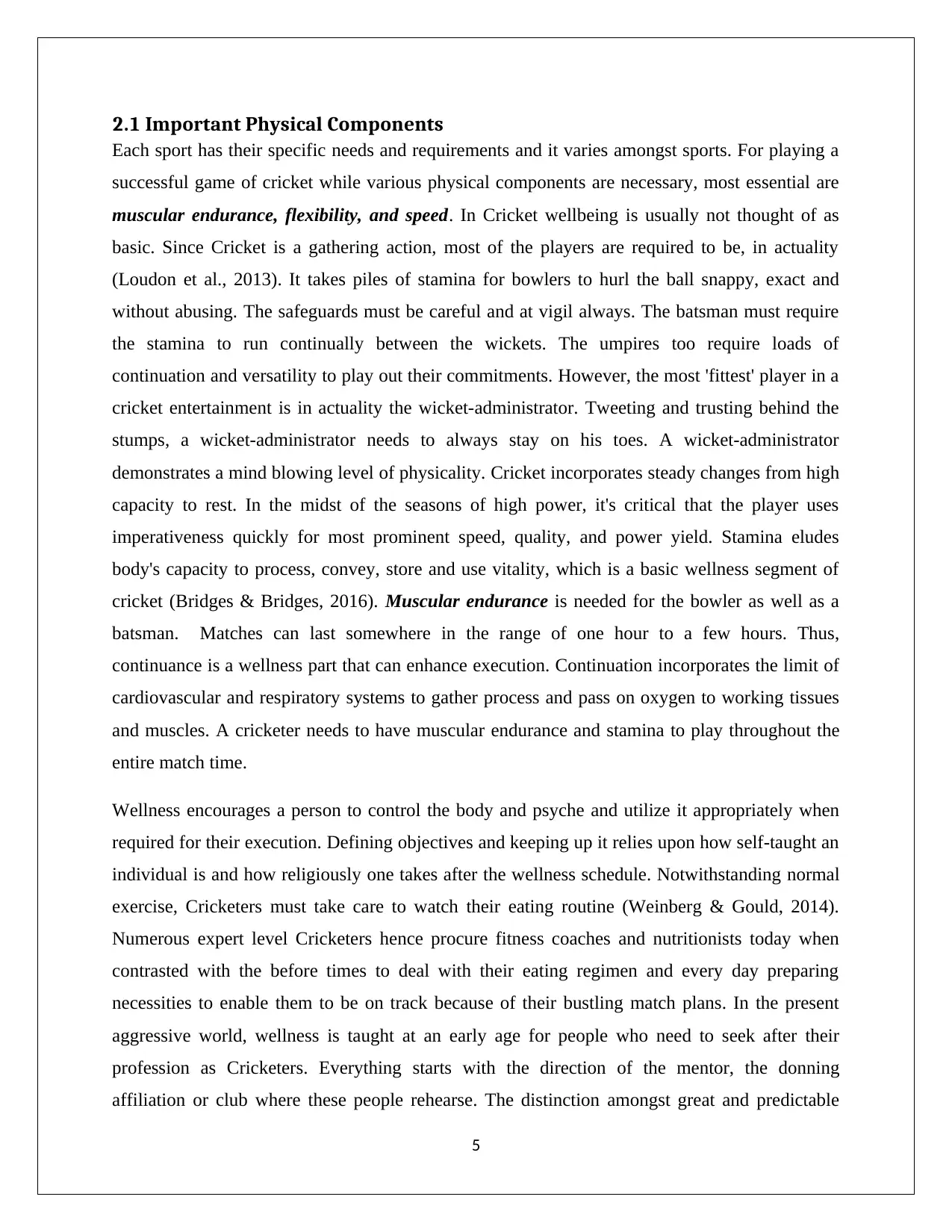
2.1 Important Physical Components
Each sport has their specific needs and requirements and it varies amongst sports. For playing a
successful game of cricket while various physical components are necessary, most essential are
muscular endurance, flexibility, and speed. In Cricket wellbeing is usually not thought of as
basic. Since Cricket is a gathering action, most of the players are required to be, in actuality
(Loudon et al., 2013). It takes piles of stamina for bowlers to hurl the ball snappy, exact and
without abusing. The safeguards must be careful and at vigil always. The batsman must require
the stamina to run continually between the wickets. The umpires too require loads of
continuation and versatility to play out their commitments. However, the most 'fittest' player in a
cricket entertainment is in actuality the wicket-administrator. Tweeting and trusting behind the
stumps, a wicket-administrator needs to always stay on his toes. A wicket-administrator
demonstrates a mind blowing level of physicality. Cricket incorporates steady changes from high
capacity to rest. In the midst of the seasons of high power, it's critical that the player uses
imperativeness quickly for most prominent speed, quality, and power yield. Stamina eludes
body's capacity to process, convey, store and use vitality, which is a basic wellness segment of
cricket (Bridges & Bridges, 2016). Muscular endurance is needed for the bowler as well as a
batsman. Matches can last somewhere in the range of one hour to a few hours. Thus,
continuance is a wellness part that can enhance execution. Continuation incorporates the limit of
cardiovascular and respiratory systems to gather process and pass on oxygen to working tissues
and muscles. A cricketer needs to have muscular endurance and stamina to play throughout the
entire match time.
Wellness encourages a person to control the body and psyche and utilize it appropriately when
required for their execution. Defining objectives and keeping up it relies upon how self-taught an
individual is and how religiously one takes after the wellness schedule. Notwithstanding normal
exercise, Cricketers must take care to watch their eating routine (Weinberg & Gould, 2014).
Numerous expert level Cricketers hence procure fitness coaches and nutritionists today when
contrasted with the before times to deal with their eating regimen and every day preparing
necessities to enable them to be on track because of their bustling match plans. In the present
aggressive world, wellness is taught at an early age for people who need to seek after their
profession as Cricketers. Everything starts with the direction of the mentor, the donning
affiliation or club where these people rehearse. The distinction amongst great and predictable
5
Each sport has their specific needs and requirements and it varies amongst sports. For playing a
successful game of cricket while various physical components are necessary, most essential are
muscular endurance, flexibility, and speed. In Cricket wellbeing is usually not thought of as
basic. Since Cricket is a gathering action, most of the players are required to be, in actuality
(Loudon et al., 2013). It takes piles of stamina for bowlers to hurl the ball snappy, exact and
without abusing. The safeguards must be careful and at vigil always. The batsman must require
the stamina to run continually between the wickets. The umpires too require loads of
continuation and versatility to play out their commitments. However, the most 'fittest' player in a
cricket entertainment is in actuality the wicket-administrator. Tweeting and trusting behind the
stumps, a wicket-administrator needs to always stay on his toes. A wicket-administrator
demonstrates a mind blowing level of physicality. Cricket incorporates steady changes from high
capacity to rest. In the midst of the seasons of high power, it's critical that the player uses
imperativeness quickly for most prominent speed, quality, and power yield. Stamina eludes
body's capacity to process, convey, store and use vitality, which is a basic wellness segment of
cricket (Bridges & Bridges, 2016). Muscular endurance is needed for the bowler as well as a
batsman. Matches can last somewhere in the range of one hour to a few hours. Thus,
continuance is a wellness part that can enhance execution. Continuation incorporates the limit of
cardiovascular and respiratory systems to gather process and pass on oxygen to working tissues
and muscles. A cricketer needs to have muscular endurance and stamina to play throughout the
entire match time.
Wellness encourages a person to control the body and psyche and utilize it appropriately when
required for their execution. Defining objectives and keeping up it relies upon how self-taught an
individual is and how religiously one takes after the wellness schedule. Notwithstanding normal
exercise, Cricketers must take care to watch their eating routine (Weinberg & Gould, 2014).
Numerous expert level Cricketers hence procure fitness coaches and nutritionists today when
contrasted with the before times to deal with their eating regimen and every day preparing
necessities to enable them to be on track because of their bustling match plans. In the present
aggressive world, wellness is taught at an early age for people who need to seek after their
profession as Cricketers. Everything starts with the direction of the mentor, the donning
affiliation or club where these people rehearse. The distinction amongst great and predictable
5
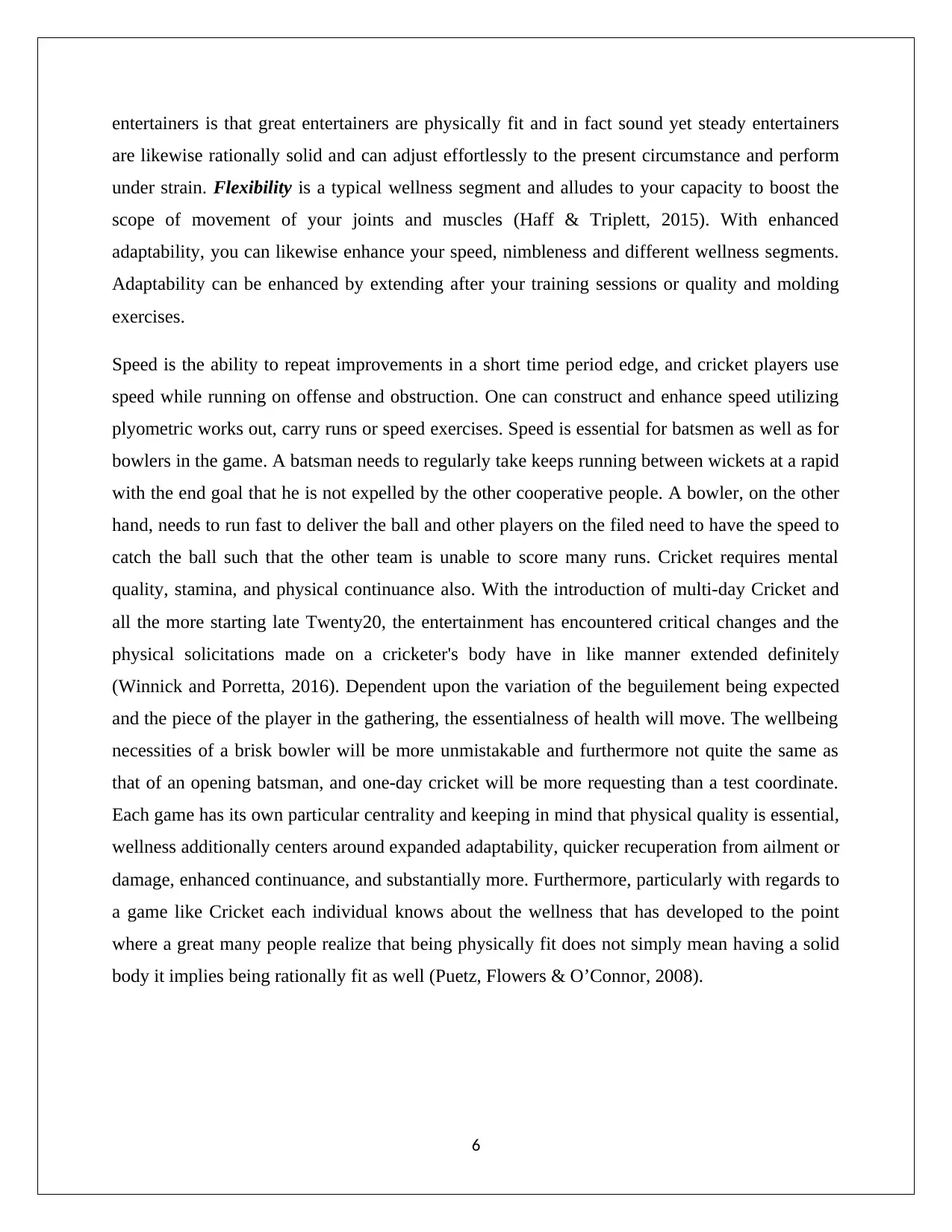
entertainers is that great entertainers are physically fit and in fact sound yet steady entertainers
are likewise rationally solid and can adjust effortlessly to the present circumstance and perform
under strain. Flexibility is a typical wellness segment and alludes to your capacity to boost the
scope of movement of your joints and muscles (Haff & Triplett, 2015). With enhanced
adaptability, you can likewise enhance your speed, nimbleness and different wellness segments.
Adaptability can be enhanced by extending after your training sessions or quality and molding
exercises.
Speed is the ability to repeat improvements in a short time period edge, and cricket players use
speed while running on offense and obstruction. One can construct and enhance speed utilizing
plyometric works out, carry runs or speed exercises. Speed is essential for batsmen as well as for
bowlers in the game. A batsman needs to regularly take keeps running between wickets at a rapid
with the end goal that he is not expelled by the other cooperative people. A bowler, on the other
hand, needs to run fast to deliver the ball and other players on the filed need to have the speed to
catch the ball such that the other team is unable to score many runs. Cricket requires mental
quality, stamina, and physical continuance also. With the introduction of multi-day Cricket and
all the more starting late Twenty20, the entertainment has encountered critical changes and the
physical solicitations made on a cricketer's body have in like manner extended definitely
(Winnick and Porretta, 2016). Dependent upon the variation of the beguilement being expected
and the piece of the player in the gathering, the essentialness of health will move. The wellbeing
necessities of a brisk bowler will be more unmistakable and furthermore not quite the same as
that of an opening batsman, and one-day cricket will be more requesting than a test coordinate.
Each game has its own particular centrality and keeping in mind that physical quality is essential,
wellness additionally centers around expanded adaptability, quicker recuperation from ailment or
damage, enhanced continuance, and substantially more. Furthermore, particularly with regards to
a game like Cricket each individual knows about the wellness that has developed to the point
where a great many people realize that being physically fit does not simply mean having a solid
body it implies being rationally fit as well (Puetz, Flowers & O’Connor, 2008).
6
are likewise rationally solid and can adjust effortlessly to the present circumstance and perform
under strain. Flexibility is a typical wellness segment and alludes to your capacity to boost the
scope of movement of your joints and muscles (Haff & Triplett, 2015). With enhanced
adaptability, you can likewise enhance your speed, nimbleness and different wellness segments.
Adaptability can be enhanced by extending after your training sessions or quality and molding
exercises.
Speed is the ability to repeat improvements in a short time period edge, and cricket players use
speed while running on offense and obstruction. One can construct and enhance speed utilizing
plyometric works out, carry runs or speed exercises. Speed is essential for batsmen as well as for
bowlers in the game. A batsman needs to regularly take keeps running between wickets at a rapid
with the end goal that he is not expelled by the other cooperative people. A bowler, on the other
hand, needs to run fast to deliver the ball and other players on the filed need to have the speed to
catch the ball such that the other team is unable to score many runs. Cricket requires mental
quality, stamina, and physical continuance also. With the introduction of multi-day Cricket and
all the more starting late Twenty20, the entertainment has encountered critical changes and the
physical solicitations made on a cricketer's body have in like manner extended definitely
(Winnick and Porretta, 2016). Dependent upon the variation of the beguilement being expected
and the piece of the player in the gathering, the essentialness of health will move. The wellbeing
necessities of a brisk bowler will be more unmistakable and furthermore not quite the same as
that of an opening batsman, and one-day cricket will be more requesting than a test coordinate.
Each game has its own particular centrality and keeping in mind that physical quality is essential,
wellness additionally centers around expanded adaptability, quicker recuperation from ailment or
damage, enhanced continuance, and substantially more. Furthermore, particularly with regards to
a game like Cricket each individual knows about the wellness that has developed to the point
where a great many people realize that being physically fit does not simply mean having a solid
body it implies being rationally fit as well (Puetz, Flowers & O’Connor, 2008).
6
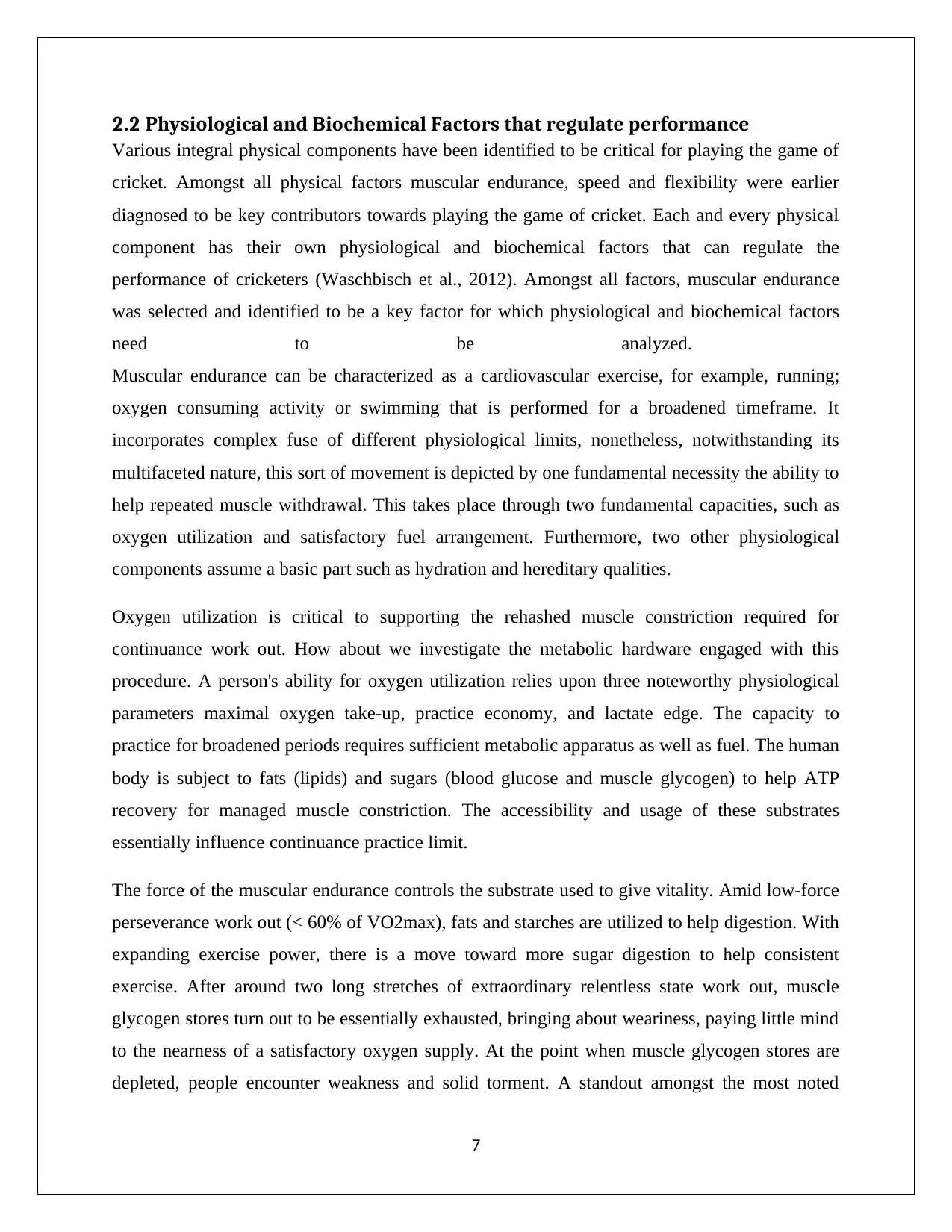
2.2 Physiological and Biochemical Factors that regulate performance
Various integral physical components have been identified to be critical for playing the game of
cricket. Amongst all physical factors muscular endurance, speed and flexibility were earlier
diagnosed to be key contributors towards playing the game of cricket. Each and every physical
component has their own physiological and biochemical factors that can regulate the
performance of cricketers (Waschbisch et al., 2012). Amongst all factors, muscular endurance
was selected and identified to be a key factor for which physiological and biochemical factors
need to be analyzed.
Muscular endurance can be characterized as a cardiovascular exercise, for example, running;
oxygen consuming activity or swimming that is performed for a broadened timeframe. It
incorporates complex fuse of different physiological limits, nonetheless, notwithstanding its
multifaceted nature, this sort of movement is depicted by one fundamental necessity the ability to
help repeated muscle withdrawal. This takes place through two fundamental capacities, such as
oxygen utilization and satisfactory fuel arrangement. Furthermore, two other physiological
components assume a basic part such as hydration and hereditary qualities.
Oxygen utilization is critical to supporting the rehashed muscle constriction required for
continuance work out. How about we investigate the metabolic hardware engaged with this
procedure. A person's ability for oxygen utilization relies upon three noteworthy physiological
parameters maximal oxygen take-up, practice economy, and lactate edge. The capacity to
practice for broadened periods requires sufficient metabolic apparatus as well as fuel. The human
body is subject to fats (lipids) and sugars (blood glucose and muscle glycogen) to help ATP
recovery for managed muscle constriction. The accessibility and usage of these substrates
essentially influence continuance practice limit.
The force of the muscular endurance controls the substrate used to give vitality. Amid low-force
perseverance work out (< 60% of VO2max), fats and starches are utilized to help digestion. With
expanding exercise power, there is a move toward more sugar digestion to help consistent
exercise. After around two long stretches of extraordinary relentless state work out, muscle
glycogen stores turn out to be essentially exhausted, bringing about weariness, paying little mind
to the nearness of a satisfactory oxygen supply. At the point when muscle glycogen stores are
depleted, people encounter weakness and solid torment. A standout amongst the most noted
7
Various integral physical components have been identified to be critical for playing the game of
cricket. Amongst all physical factors muscular endurance, speed and flexibility were earlier
diagnosed to be key contributors towards playing the game of cricket. Each and every physical
component has their own physiological and biochemical factors that can regulate the
performance of cricketers (Waschbisch et al., 2012). Amongst all factors, muscular endurance
was selected and identified to be a key factor for which physiological and biochemical factors
need to be analyzed.
Muscular endurance can be characterized as a cardiovascular exercise, for example, running;
oxygen consuming activity or swimming that is performed for a broadened timeframe. It
incorporates complex fuse of different physiological limits, nonetheless, notwithstanding its
multifaceted nature, this sort of movement is depicted by one fundamental necessity the ability to
help repeated muscle withdrawal. This takes place through two fundamental capacities, such as
oxygen utilization and satisfactory fuel arrangement. Furthermore, two other physiological
components assume a basic part such as hydration and hereditary qualities.
Oxygen utilization is critical to supporting the rehashed muscle constriction required for
continuance work out. How about we investigate the metabolic hardware engaged with this
procedure. A person's ability for oxygen utilization relies upon three noteworthy physiological
parameters maximal oxygen take-up, practice economy, and lactate edge. The capacity to
practice for broadened periods requires sufficient metabolic apparatus as well as fuel. The human
body is subject to fats (lipids) and sugars (blood glucose and muscle glycogen) to help ATP
recovery for managed muscle constriction. The accessibility and usage of these substrates
essentially influence continuance practice limit.
The force of the muscular endurance controls the substrate used to give vitality. Amid low-force
perseverance work out (< 60% of VO2max), fats and starches are utilized to help digestion. With
expanding exercise power, there is a move toward more sugar digestion to help consistent
exercise. After around two long stretches of extraordinary relentless state work out, muscle
glycogen stores turn out to be essentially exhausted, bringing about weariness, paying little mind
to the nearness of a satisfactory oxygen supply. At the point when muscle glycogen stores are
depleted, people encounter weakness and solid torment. A standout amongst the most noted
7
Paraphrase This Document
Need a fresh take? Get an instant paraphrase of this document with our AI Paraphraser
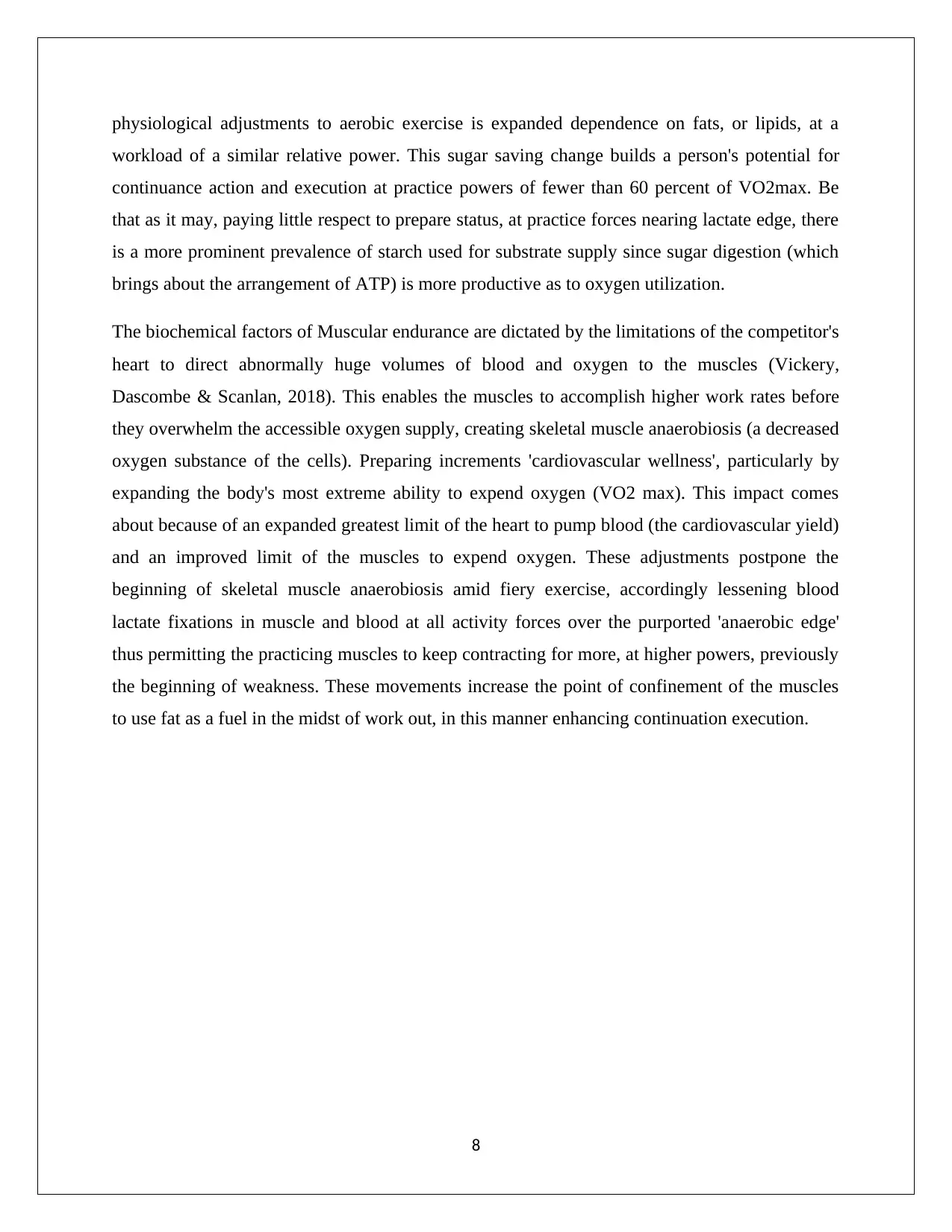
physiological adjustments to aerobic exercise is expanded dependence on fats, or lipids, at a
workload of a similar relative power. This sugar saving change builds a person's potential for
continuance action and execution at practice powers of fewer than 60 percent of VO2max. Be
that as it may, paying little respect to prepare status, at practice forces nearing lactate edge, there
is a more prominent prevalence of starch used for substrate supply since sugar digestion (which
brings about the arrangement of ATP) is more productive as to oxygen utilization.
The biochemical factors of Muscular endurance are dictated by the limitations of the competitor's
heart to direct abnormally huge volumes of blood and oxygen to the muscles (Vickery,
Dascombe & Scanlan, 2018). This enables the muscles to accomplish higher work rates before
they overwhelm the accessible oxygen supply, creating skeletal muscle anaerobiosis (a decreased
oxygen substance of the cells). Preparing increments 'cardiovascular wellness', particularly by
expanding the body's most extreme ability to expend oxygen (VO2 max). This impact comes
about because of an expanded greatest limit of the heart to pump blood (the cardiovascular yield)
and an improved limit of the muscles to expend oxygen. These adjustments postpone the
beginning of skeletal muscle anaerobiosis amid fiery exercise, accordingly lessening blood
lactate fixations in muscle and blood at all activity forces over the purported 'anaerobic edge'
thus permitting the practicing muscles to keep contracting for more, at higher powers, previously
the beginning of weakness. These movements increase the point of confinement of the muscles
to use fat as a fuel in the midst of work out, in this manner enhancing continuation execution.
8
workload of a similar relative power. This sugar saving change builds a person's potential for
continuance action and execution at practice powers of fewer than 60 percent of VO2max. Be
that as it may, paying little respect to prepare status, at practice forces nearing lactate edge, there
is a more prominent prevalence of starch used for substrate supply since sugar digestion (which
brings about the arrangement of ATP) is more productive as to oxygen utilization.
The biochemical factors of Muscular endurance are dictated by the limitations of the competitor's
heart to direct abnormally huge volumes of blood and oxygen to the muscles (Vickery,
Dascombe & Scanlan, 2018). This enables the muscles to accomplish higher work rates before
they overwhelm the accessible oxygen supply, creating skeletal muscle anaerobiosis (a decreased
oxygen substance of the cells). Preparing increments 'cardiovascular wellness', particularly by
expanding the body's most extreme ability to expend oxygen (VO2 max). This impact comes
about because of an expanded greatest limit of the heart to pump blood (the cardiovascular yield)
and an improved limit of the muscles to expend oxygen. These adjustments postpone the
beginning of skeletal muscle anaerobiosis amid fiery exercise, accordingly lessening blood
lactate fixations in muscle and blood at all activity forces over the purported 'anaerobic edge'
thus permitting the practicing muscles to keep contracting for more, at higher powers, previously
the beginning of weakness. These movements increase the point of confinement of the muscles
to use fat as a fuel in the midst of work out, in this manner enhancing continuation execution.
8
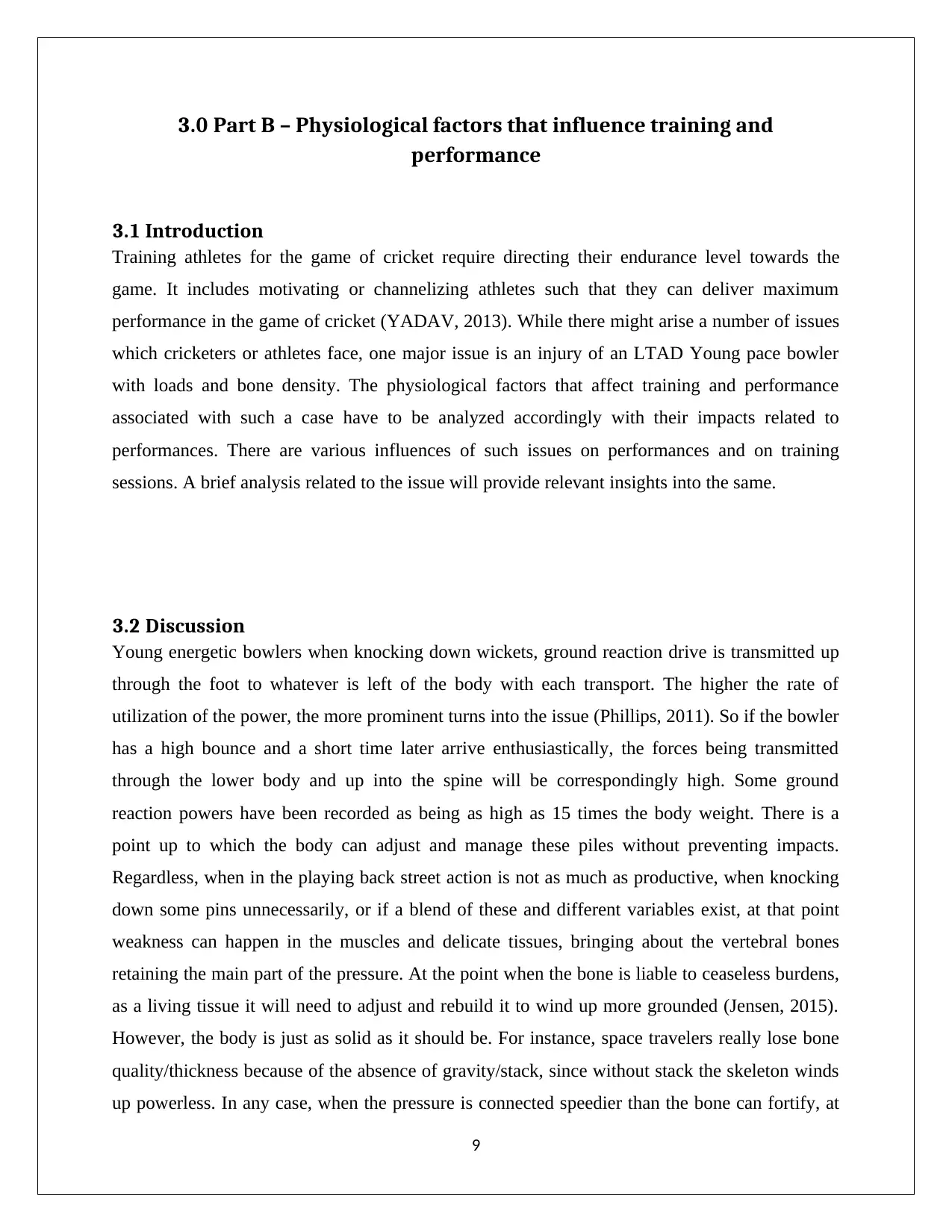
3.0 Part B – Physiological factors that influence training and
performance
3.1 Introduction
Training athletes for the game of cricket require directing their endurance level towards the
game. It includes motivating or channelizing athletes such that they can deliver maximum
performance in the game of cricket (YADAV, 2013). While there might arise a number of issues
which cricketers or athletes face, one major issue is an injury of an LTAD Young pace bowler
with loads and bone density. The physiological factors that affect training and performance
associated with such a case have to be analyzed accordingly with their impacts related to
performances. There are various influences of such issues on performances and on training
sessions. A brief analysis related to the issue will provide relevant insights into the same.
3.2 Discussion
Young energetic bowlers when knocking down wickets, ground reaction drive is transmitted up
through the foot to whatever is left of the body with each transport. The higher the rate of
utilization of the power, the more prominent turns into the issue (Phillips, 2011). So if the bowler
has a high bounce and a short time later arrive enthusiastically, the forces being transmitted
through the lower body and up into the spine will be correspondingly high. Some ground
reaction powers have been recorded as being as high as 15 times the body weight. There is a
point up to which the body can adjust and manage these piles without preventing impacts.
Regardless, when in the playing back street action is not as much as productive, when knocking
down some pins unnecessarily, or if a blend of these and different variables exist, at that point
weakness can happen in the muscles and delicate tissues, bringing about the vertebral bones
retaining the main part of the pressure. At the point when the bone is liable to ceaseless burdens,
as a living tissue it will need to adjust and rebuild it to wind up more grounded (Jensen, 2015).
However, the body is just as solid as it should be. For instance, space travelers really lose bone
quality/thickness because of the absence of gravity/stack, since without stack the skeleton winds
up powerless. In any case, when the pressure is connected speedier than the bone can fortify, at
9
performance
3.1 Introduction
Training athletes for the game of cricket require directing their endurance level towards the
game. It includes motivating or channelizing athletes such that they can deliver maximum
performance in the game of cricket (YADAV, 2013). While there might arise a number of issues
which cricketers or athletes face, one major issue is an injury of an LTAD Young pace bowler
with loads and bone density. The physiological factors that affect training and performance
associated with such a case have to be analyzed accordingly with their impacts related to
performances. There are various influences of such issues on performances and on training
sessions. A brief analysis related to the issue will provide relevant insights into the same.
3.2 Discussion
Young energetic bowlers when knocking down wickets, ground reaction drive is transmitted up
through the foot to whatever is left of the body with each transport. The higher the rate of
utilization of the power, the more prominent turns into the issue (Phillips, 2011). So if the bowler
has a high bounce and a short time later arrive enthusiastically, the forces being transmitted
through the lower body and up into the spine will be correspondingly high. Some ground
reaction powers have been recorded as being as high as 15 times the body weight. There is a
point up to which the body can adjust and manage these piles without preventing impacts.
Regardless, when in the playing back street action is not as much as productive, when knocking
down some pins unnecessarily, or if a blend of these and different variables exist, at that point
weakness can happen in the muscles and delicate tissues, bringing about the vertebral bones
retaining the main part of the pressure. At the point when the bone is liable to ceaseless burdens,
as a living tissue it will need to adjust and rebuild it to wind up more grounded (Jensen, 2015).
However, the body is just as solid as it should be. For instance, space travelers really lose bone
quality/thickness because of the absence of gravity/stack, since without stack the skeleton winds
up powerless. In any case, when the pressure is connected speedier than the bone can fortify, at
9
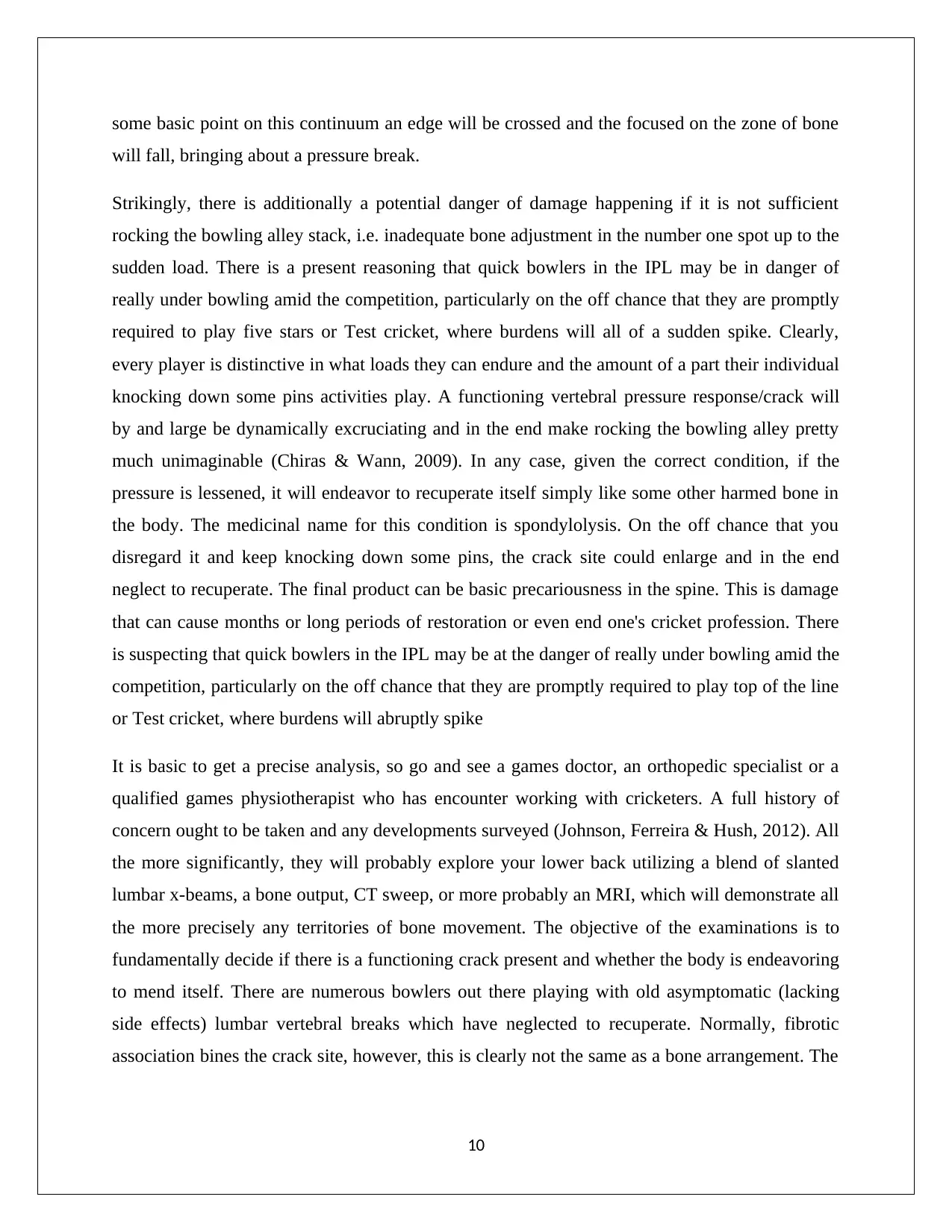
some basic point on this continuum an edge will be crossed and the focused on the zone of bone
will fall, bringing about a pressure break.
Strikingly, there is additionally a potential danger of damage happening if it is not sufficient
rocking the bowling alley stack, i.e. inadequate bone adjustment in the number one spot up to the
sudden load. There is a present reasoning that quick bowlers in the IPL may be in danger of
really under bowling amid the competition, particularly on the off chance that they are promptly
required to play five stars or Test cricket, where burdens will all of a sudden spike. Clearly,
every player is distinctive in what loads they can endure and the amount of a part their individual
knocking down some pins activities play. A functioning vertebral pressure response/crack will
by and large be dynamically excruciating and in the end make rocking the bowling alley pretty
much unimaginable (Chiras & Wann, 2009). In any case, given the correct condition, if the
pressure is lessened, it will endeavor to recuperate itself simply like some other harmed bone in
the body. The medicinal name for this condition is spondylolysis. On the off chance that you
disregard it and keep knocking down some pins, the crack site could enlarge and in the end
neglect to recuperate. The final product can be basic precariousness in the spine. This is damage
that can cause months or long periods of restoration or even end one's cricket profession. There
is suspecting that quick bowlers in the IPL may be at the danger of really under bowling amid the
competition, particularly on the off chance that they are promptly required to play top of the line
or Test cricket, where burdens will abruptly spike
It is basic to get a precise analysis, so go and see a games doctor, an orthopedic specialist or a
qualified games physiotherapist who has encounter working with cricketers. A full history of
concern ought to be taken and any developments surveyed (Johnson, Ferreira & Hush, 2012). All
the more significantly, they will probably explore your lower back utilizing a blend of slanted
lumbar x-beams, a bone output, CT sweep, or more probably an MRI, which will demonstrate all
the more precisely any territories of bone movement. The objective of the examinations is to
fundamentally decide if there is a functioning crack present and whether the body is endeavoring
to mend itself. There are numerous bowlers out there playing with old asymptomatic (lacking
side effects) lumbar vertebral breaks which have neglected to recuperate. Normally, fibrotic
association bines the crack site, however, this is clearly not the same as a bone arrangement. The
10
will fall, bringing about a pressure break.
Strikingly, there is additionally a potential danger of damage happening if it is not sufficient
rocking the bowling alley stack, i.e. inadequate bone adjustment in the number one spot up to the
sudden load. There is a present reasoning that quick bowlers in the IPL may be in danger of
really under bowling amid the competition, particularly on the off chance that they are promptly
required to play five stars or Test cricket, where burdens will all of a sudden spike. Clearly,
every player is distinctive in what loads they can endure and the amount of a part their individual
knocking down some pins activities play. A functioning vertebral pressure response/crack will
by and large be dynamically excruciating and in the end make rocking the bowling alley pretty
much unimaginable (Chiras & Wann, 2009). In any case, given the correct condition, if the
pressure is lessened, it will endeavor to recuperate itself simply like some other harmed bone in
the body. The medicinal name for this condition is spondylolysis. On the off chance that you
disregard it and keep knocking down some pins, the crack site could enlarge and in the end
neglect to recuperate. The final product can be basic precariousness in the spine. This is damage
that can cause months or long periods of restoration or even end one's cricket profession. There
is suspecting that quick bowlers in the IPL may be at the danger of really under bowling amid the
competition, particularly on the off chance that they are promptly required to play top of the line
or Test cricket, where burdens will abruptly spike
It is basic to get a precise analysis, so go and see a games doctor, an orthopedic specialist or a
qualified games physiotherapist who has encounter working with cricketers. A full history of
concern ought to be taken and any developments surveyed (Johnson, Ferreira & Hush, 2012). All
the more significantly, they will probably explore your lower back utilizing a blend of slanted
lumbar x-beams, a bone output, CT sweep, or more probably an MRI, which will demonstrate all
the more precisely any territories of bone movement. The objective of the examinations is to
fundamentally decide if there is a functioning crack present and whether the body is endeavoring
to mend itself. There are numerous bowlers out there playing with old asymptomatic (lacking
side effects) lumbar vertebral breaks which have neglected to recuperate. Normally, fibrotic
association bines the crack site, however, this is clearly not the same as a bone arrangement. The
10
Secure Best Marks with AI Grader
Need help grading? Try our AI Grader for instant feedback on your assignments.
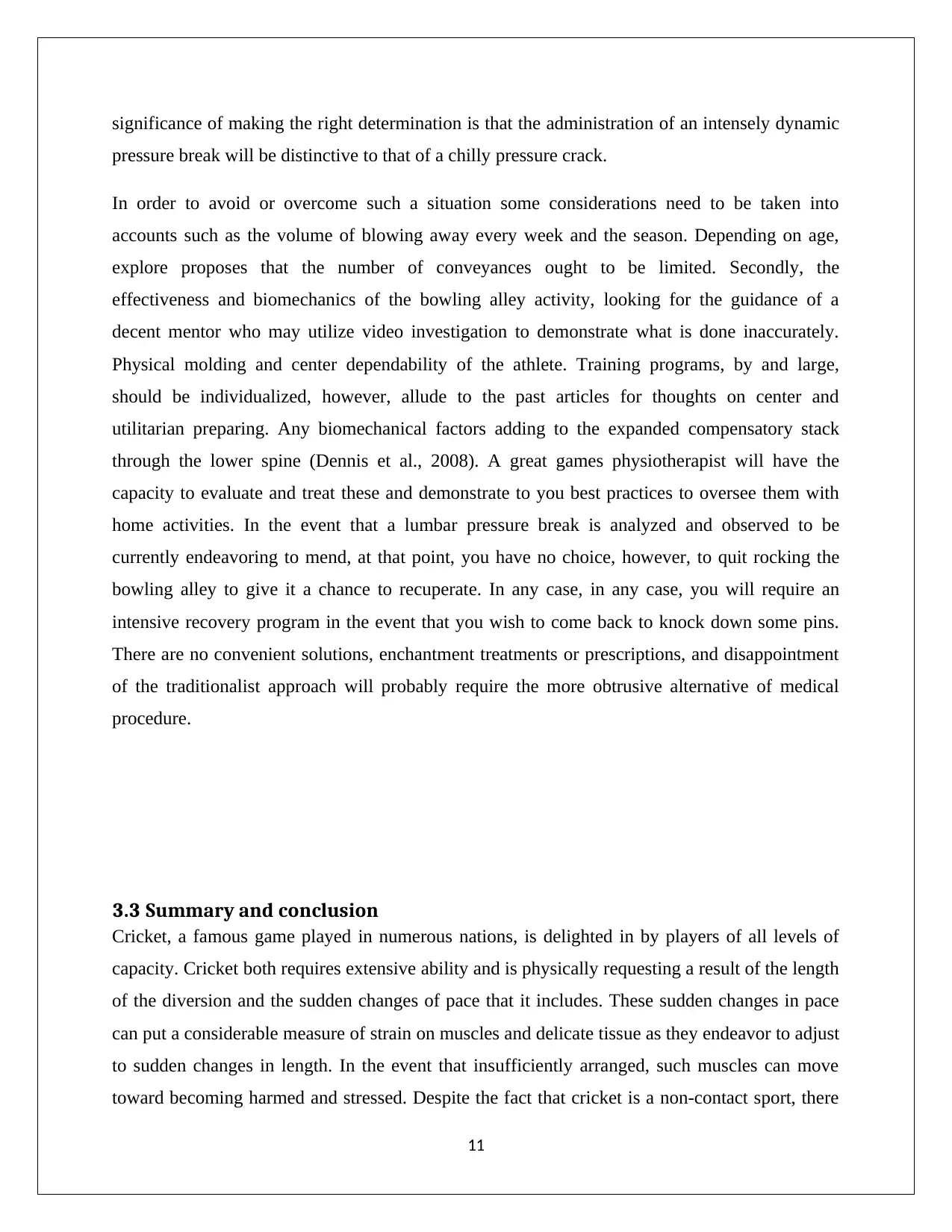
significance of making the right determination is that the administration of an intensely dynamic
pressure break will be distinctive to that of a chilly pressure crack.
In order to avoid or overcome such a situation some considerations need to be taken into
accounts such as the volume of blowing away every week and the season. Depending on age,
explore proposes that the number of conveyances ought to be limited. Secondly, the
effectiveness and biomechanics of the bowling alley activity, looking for the guidance of a
decent mentor who may utilize video investigation to demonstrate what is done inaccurately.
Physical molding and center dependability of the athlete. Training programs, by and large,
should be individualized, however, allude to the past articles for thoughts on center and
utilitarian preparing. Any biomechanical factors adding to the expanded compensatory stack
through the lower spine (Dennis et al., 2008). A great games physiotherapist will have the
capacity to evaluate and treat these and demonstrate to you best practices to oversee them with
home activities. In the event that a lumbar pressure break is analyzed and observed to be
currently endeavoring to mend, at that point, you have no choice, however, to quit rocking the
bowling alley to give it a chance to recuperate. In any case, in any case, you will require an
intensive recovery program in the event that you wish to come back to knock down some pins.
There are no convenient solutions, enchantment treatments or prescriptions, and disappointment
of the traditionalist approach will probably require the more obtrusive alternative of medical
procedure.
3.3 Summary and conclusion
Cricket, a famous game played in numerous nations, is delighted in by players of all levels of
capacity. Cricket both requires extensive ability and is physically requesting a result of the length
of the diversion and the sudden changes of pace that it includes. These sudden changes in pace
can put a considerable measure of strain on muscles and delicate tissue as they endeavor to adjust
to sudden changes in length. In the event that insufficiently arranged, such muscles can move
toward becoming harmed and stressed. Despite the fact that cricket is a non-contact sport, there
11
pressure break will be distinctive to that of a chilly pressure crack.
In order to avoid or overcome such a situation some considerations need to be taken into
accounts such as the volume of blowing away every week and the season. Depending on age,
explore proposes that the number of conveyances ought to be limited. Secondly, the
effectiveness and biomechanics of the bowling alley activity, looking for the guidance of a
decent mentor who may utilize video investigation to demonstrate what is done inaccurately.
Physical molding and center dependability of the athlete. Training programs, by and large,
should be individualized, however, allude to the past articles for thoughts on center and
utilitarian preparing. Any biomechanical factors adding to the expanded compensatory stack
through the lower spine (Dennis et al., 2008). A great games physiotherapist will have the
capacity to evaluate and treat these and demonstrate to you best practices to oversee them with
home activities. In the event that a lumbar pressure break is analyzed and observed to be
currently endeavoring to mend, at that point, you have no choice, however, to quit rocking the
bowling alley to give it a chance to recuperate. In any case, in any case, you will require an
intensive recovery program in the event that you wish to come back to knock down some pins.
There are no convenient solutions, enchantment treatments or prescriptions, and disappointment
of the traditionalist approach will probably require the more obtrusive alternative of medical
procedure.
3.3 Summary and conclusion
Cricket, a famous game played in numerous nations, is delighted in by players of all levels of
capacity. Cricket both requires extensive ability and is physically requesting a result of the length
of the diversion and the sudden changes of pace that it includes. These sudden changes in pace
can put a considerable measure of strain on muscles and delicate tissue as they endeavor to adjust
to sudden changes in length. In the event that insufficiently arranged, such muscles can move
toward becoming harmed and stressed. Despite the fact that cricket is a non-contact sport, there
11
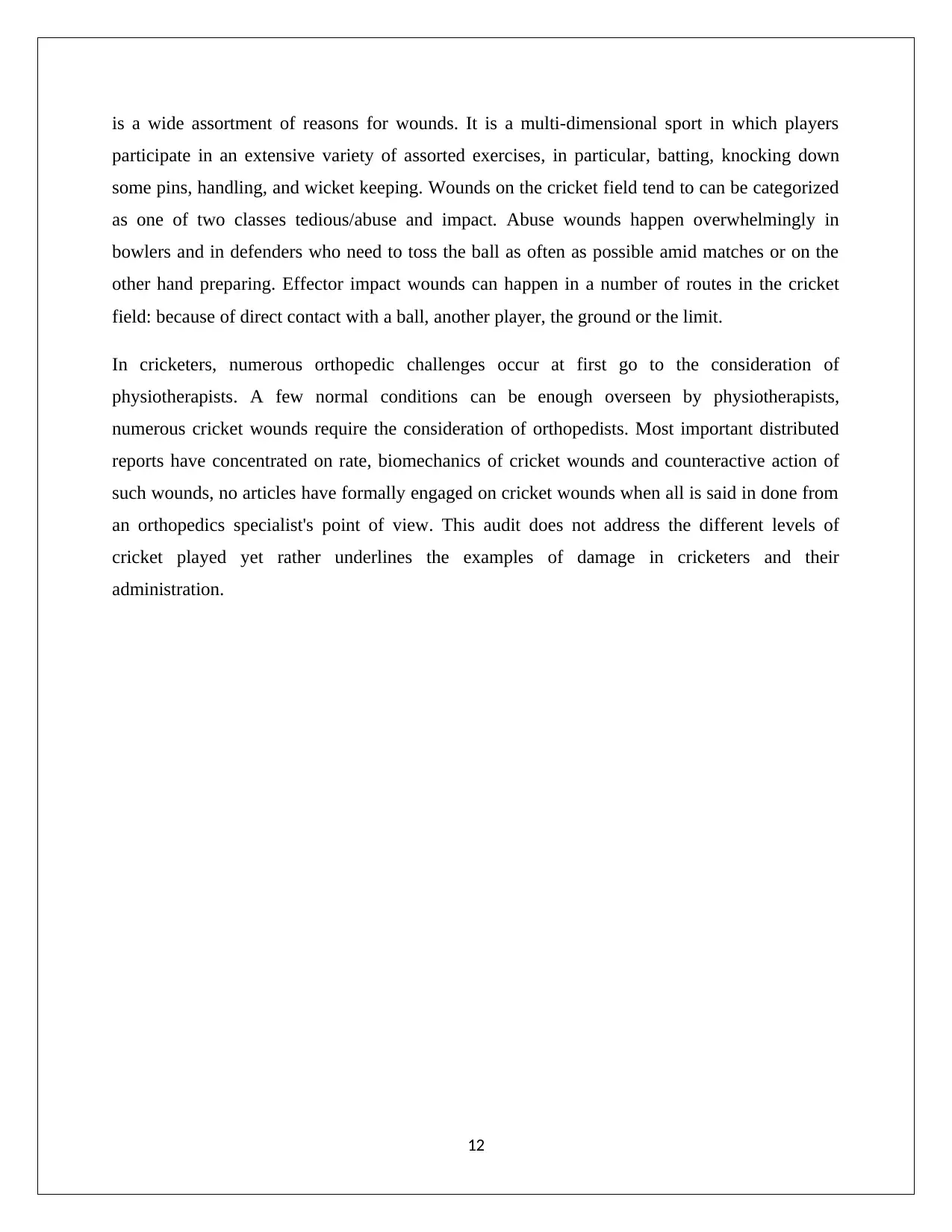
is a wide assortment of reasons for wounds. It is a multi-dimensional sport in which players
participate in an extensive variety of assorted exercises, in particular, batting, knocking down
some pins, handling, and wicket keeping. Wounds on the cricket field tend to can be categorized
as one of two classes tedious/abuse and impact. Abuse wounds happen overwhelmingly in
bowlers and in defenders who need to toss the ball as often as possible amid matches or on the
other hand preparing. Effector impact wounds can happen in a number of routes in the cricket
field: because of direct contact with a ball, another player, the ground or the limit.
In cricketers, numerous orthopedic challenges occur at first go to the consideration of
physiotherapists. A few normal conditions can be enough overseen by physiotherapists,
numerous cricket wounds require the consideration of orthopedists. Most important distributed
reports have concentrated on rate, biomechanics of cricket wounds and counteractive action of
such wounds, no articles have formally engaged on cricket wounds when all is said in done from
an orthopedics specialist's point of view. This audit does not address the different levels of
cricket played yet rather underlines the examples of damage in cricketers and their
administration.
12
participate in an extensive variety of assorted exercises, in particular, batting, knocking down
some pins, handling, and wicket keeping. Wounds on the cricket field tend to can be categorized
as one of two classes tedious/abuse and impact. Abuse wounds happen overwhelmingly in
bowlers and in defenders who need to toss the ball as often as possible amid matches or on the
other hand preparing. Effector impact wounds can happen in a number of routes in the cricket
field: because of direct contact with a ball, another player, the ground or the limit.
In cricketers, numerous orthopedic challenges occur at first go to the consideration of
physiotherapists. A few normal conditions can be enough overseen by physiotherapists,
numerous cricket wounds require the consideration of orthopedists. Most important distributed
reports have concentrated on rate, biomechanics of cricket wounds and counteractive action of
such wounds, no articles have formally engaged on cricket wounds when all is said in done from
an orthopedics specialist's point of view. This audit does not address the different levels of
cricket played yet rather underlines the examples of damage in cricketers and their
administration.
12
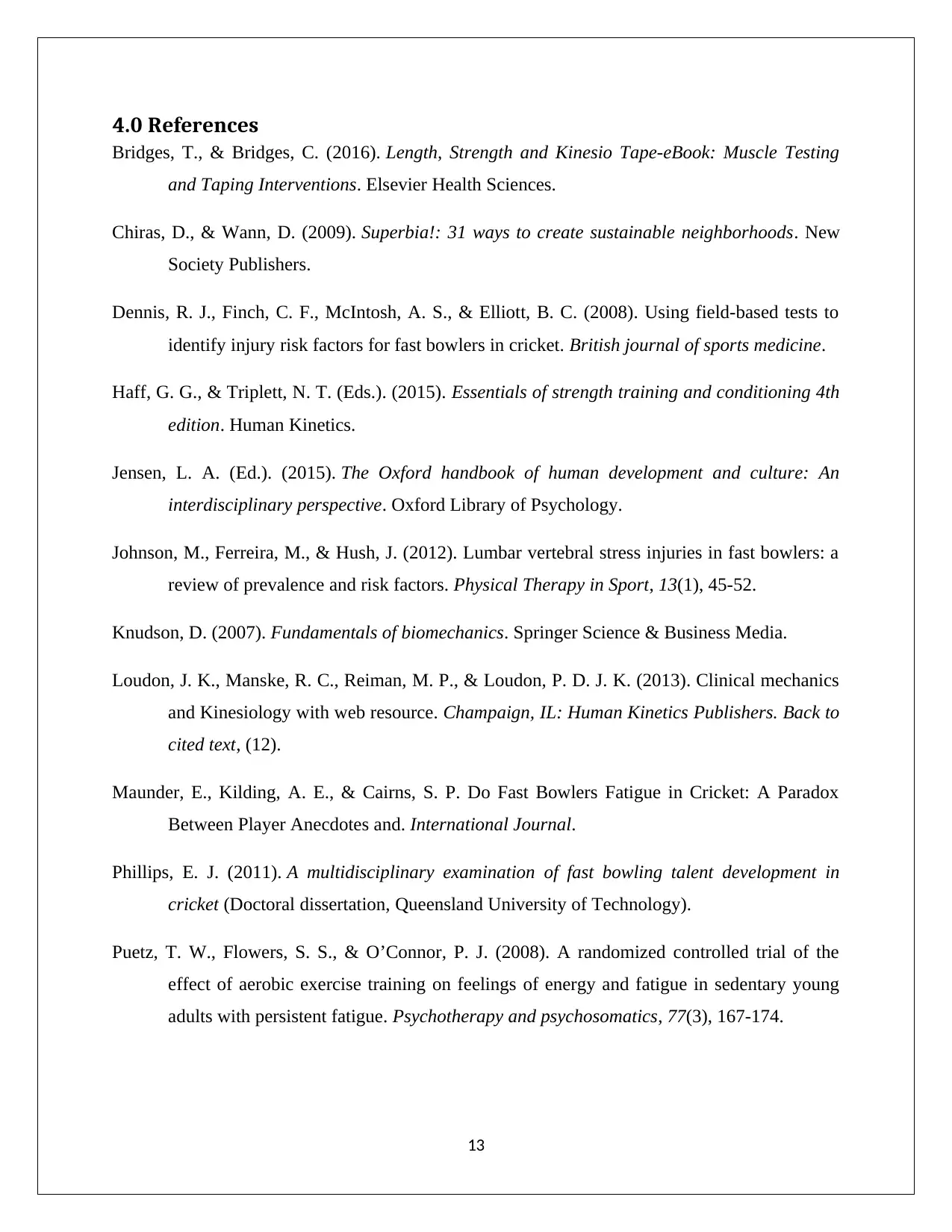
4.0 References
Bridges, T., & Bridges, C. (2016). Length, Strength and Kinesio Tape-eBook: Muscle Testing
and Taping Interventions. Elsevier Health Sciences.
Chiras, D., & Wann, D. (2009). Superbia!: 31 ways to create sustainable neighborhoods. New
Society Publishers.
Dennis, R. J., Finch, C. F., McIntosh, A. S., & Elliott, B. C. (2008). Using field-based tests to
identify injury risk factors for fast bowlers in cricket. British journal of sports medicine.
Haff, G. G., & Triplett, N. T. (Eds.). (2015). Essentials of strength training and conditioning 4th
edition. Human Kinetics.
Jensen, L. A. (Ed.). (2015). The Oxford handbook of human development and culture: An
interdisciplinary perspective. Oxford Library of Psychology.
Johnson, M., Ferreira, M., & Hush, J. (2012). Lumbar vertebral stress injuries in fast bowlers: a
review of prevalence and risk factors. Physical Therapy in Sport, 13(1), 45-52.
Knudson, D. (2007). Fundamentals of biomechanics. Springer Science & Business Media.
Loudon, J. K., Manske, R. C., Reiman, M. P., & Loudon, P. D. J. K. (2013). Clinical mechanics
and Kinesiology with web resource. Champaign, IL: Human Kinetics Publishers. Back to
cited text, (12).
Maunder, E., Kilding, A. E., & Cairns, S. P. Do Fast Bowlers Fatigue in Cricket: A Paradox
Between Player Anecdotes and. International Journal.
Phillips, E. J. (2011). A multidisciplinary examination of fast bowling talent development in
cricket (Doctoral dissertation, Queensland University of Technology).
Puetz, T. W., Flowers, S. S., & O’Connor, P. J. (2008). A randomized controlled trial of the
effect of aerobic exercise training on feelings of energy and fatigue in sedentary young
adults with persistent fatigue. Psychotherapy and psychosomatics, 77(3), 167-174.
13
Bridges, T., & Bridges, C. (2016). Length, Strength and Kinesio Tape-eBook: Muscle Testing
and Taping Interventions. Elsevier Health Sciences.
Chiras, D., & Wann, D. (2009). Superbia!: 31 ways to create sustainable neighborhoods. New
Society Publishers.
Dennis, R. J., Finch, C. F., McIntosh, A. S., & Elliott, B. C. (2008). Using field-based tests to
identify injury risk factors for fast bowlers in cricket. British journal of sports medicine.
Haff, G. G., & Triplett, N. T. (Eds.). (2015). Essentials of strength training and conditioning 4th
edition. Human Kinetics.
Jensen, L. A. (Ed.). (2015). The Oxford handbook of human development and culture: An
interdisciplinary perspective. Oxford Library of Psychology.
Johnson, M., Ferreira, M., & Hush, J. (2012). Lumbar vertebral stress injuries in fast bowlers: a
review of prevalence and risk factors. Physical Therapy in Sport, 13(1), 45-52.
Knudson, D. (2007). Fundamentals of biomechanics. Springer Science & Business Media.
Loudon, J. K., Manske, R. C., Reiman, M. P., & Loudon, P. D. J. K. (2013). Clinical mechanics
and Kinesiology with web resource. Champaign, IL: Human Kinetics Publishers. Back to
cited text, (12).
Maunder, E., Kilding, A. E., & Cairns, S. P. Do Fast Bowlers Fatigue in Cricket: A Paradox
Between Player Anecdotes and. International Journal.
Phillips, E. J. (2011). A multidisciplinary examination of fast bowling talent development in
cricket (Doctoral dissertation, Queensland University of Technology).
Puetz, T. W., Flowers, S. S., & O’Connor, P. J. (2008). A randomized controlled trial of the
effect of aerobic exercise training on feelings of energy and fatigue in sedentary young
adults with persistent fatigue. Psychotherapy and psychosomatics, 77(3), 167-174.
13
Paraphrase This Document
Need a fresh take? Get an instant paraphrase of this document with our AI Paraphraser
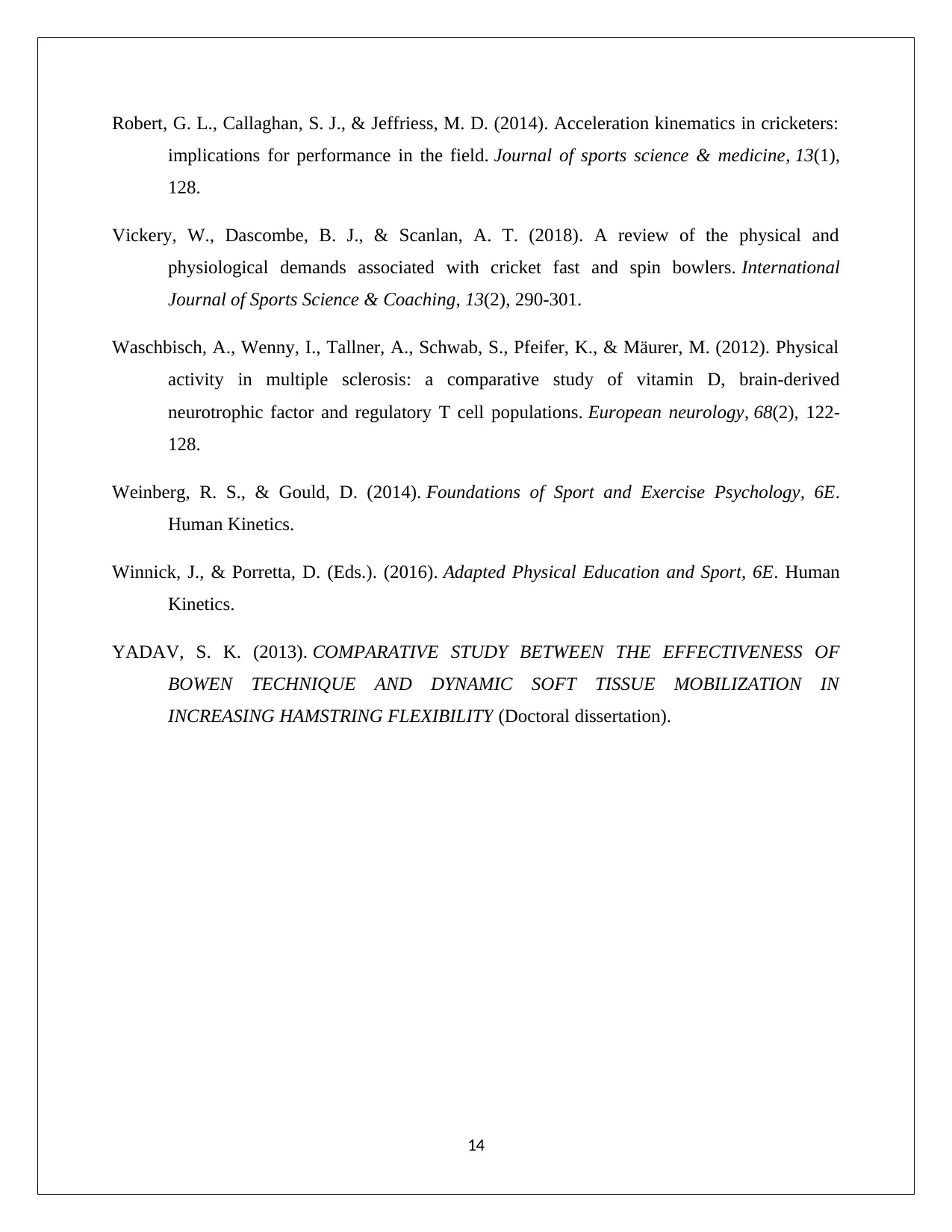
Robert, G. L., Callaghan, S. J., & Jeffriess, M. D. (2014). Acceleration kinematics in cricketers:
implications for performance in the field. Journal of sports science & medicine, 13(1),
128.
Vickery, W., Dascombe, B. J., & Scanlan, A. T. (2018). A review of the physical and
physiological demands associated with cricket fast and spin bowlers. International
Journal of Sports Science & Coaching, 13(2), 290-301.
Waschbisch, A., Wenny, I., Tallner, A., Schwab, S., Pfeifer, K., & Mäurer, M. (2012). Physical
activity in multiple sclerosis: a comparative study of vitamin D, brain-derived
neurotrophic factor and regulatory T cell populations. European neurology, 68(2), 122-
128.
Weinberg, R. S., & Gould, D. (2014). Foundations of Sport and Exercise Psychology, 6E.
Human Kinetics.
Winnick, J., & Porretta, D. (Eds.). (2016). Adapted Physical Education and Sport, 6E. Human
Kinetics.
YADAV, S. K. (2013). COMPARATIVE STUDY BETWEEN THE EFFECTIVENESS OF
BOWEN TECHNIQUE AND DYNAMIC SOFT TISSUE MOBILIZATION IN
INCREASING HAMSTRING FLEXIBILITY (Doctoral dissertation).
14
implications for performance in the field. Journal of sports science & medicine, 13(1),
128.
Vickery, W., Dascombe, B. J., & Scanlan, A. T. (2018). A review of the physical and
physiological demands associated with cricket fast and spin bowlers. International
Journal of Sports Science & Coaching, 13(2), 290-301.
Waschbisch, A., Wenny, I., Tallner, A., Schwab, S., Pfeifer, K., & Mäurer, M. (2012). Physical
activity in multiple sclerosis: a comparative study of vitamin D, brain-derived
neurotrophic factor and regulatory T cell populations. European neurology, 68(2), 122-
128.
Weinberg, R. S., & Gould, D. (2014). Foundations of Sport and Exercise Psychology, 6E.
Human Kinetics.
Winnick, J., & Porretta, D. (Eds.). (2016). Adapted Physical Education and Sport, 6E. Human
Kinetics.
YADAV, S. K. (2013). COMPARATIVE STUDY BETWEEN THE EFFECTIVENESS OF
BOWEN TECHNIQUE AND DYNAMIC SOFT TISSUE MOBILIZATION IN
INCREASING HAMSTRING FLEXIBILITY (Doctoral dissertation).
14
1 out of 14
Your All-in-One AI-Powered Toolkit for Academic Success.
+13062052269
info@desklib.com
Available 24*7 on WhatsApp / Email
![[object Object]](/_next/static/media/star-bottom.7253800d.svg)
Unlock your academic potential
© 2024 | Zucol Services PVT LTD | All rights reserved.
